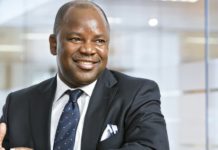
[miningmx.com] — KEEP your eyes peeled for developments between Randgold & Exploration (RG&E) and its offshore prodigy, the New York-listed gold exploration firm, Randgold Resources. Ask any family, a squabble between siblings is de facto a personal dual. At the moment, however, there’s a cold war underway.
A fortnight ago, Randgold Resources issued an update of its major shareholders confirming the decline in direct influence of RG&E in the company to about 6.74%. The update was a strategic decision. Mark Bristow, Randgold Resources CEO, had been making the point informally for several weeks prior; more specifically, he couldn’t figure why RG&E had not disclosed a reduction – by some 14 million shares – of its stake in Randgold Resources, from about 31%.
Even before Bristow’s comments, RG&E’s CEO, Brett Kebble, had been issued two letters; one from the Bank of New York, and another from Bristow himself, asking for details regarding the exact nature of the company’s shareholding. At the time, Kebble promised an explanation, a pledge he repeated this week to Business Day, a South African newspaper.
According to the newspaper, there’s a meeting scheduled between Brett Kebble and Bristow for next week at which the matter will be clarified. However, Kebble has already made his views clear.
In a recorded and transcribed interview with miningmx, Kebble recounted early statements that he had borrowed against shares in Randgold Resources, first reported by miningmx on November 15. In miningmx’s February 9 interview, Kebble said: “I can understand people looking at the share register and saying, “that’s what you own’, but it is possible to own shares in nominee companies’.
“We have an effective stake of 31.6% in the company [Randgold Resources], and we do not intend selling the shares at this point in time,’ Kebble said. “We have a further call option of 5% to 6% that would allow us to go back to 35% to 36%,’ he added.
Said Kebble: “I think we’re unlikely to exercise that call at this point in time, but would do so in the event of a transaction that Mark got himself involved in that would dilute the stock’.
According to Randgold Resources financial director, Roger Williams, however, the major shareholders in the company are identifiably not nominee companies. Merrill Lynch UK is now the company’s largest single shareholder with a holding of 6.89%. After RG&E, the next major shareholder is Mackenzie Financial (4.86%), followed by Van Eck Associates (4.1%), and Tocqueville Asset Management (2.44%).
Williams said potential nominee firms, as listed in the shareholder register (and viewed by miningmx on February 10), own relatively tiny parcels of shares. Kebble would need to have shovelled his 14 million Randgold Resources shares (about 26% of the company) into 70 nominee companies, or more, Williams said.
The cruces of this matter is whether Kebble has, in fact, sold these shares, and whether disclosure is required.
The JSE Securities Exchange confirmed a transaction that involves more than 30% of a company’s market value requires a fully-fledged shareholders meeting with the necessary circular. Transactions involving company shares worth between 10% and 20%, or less than 10% of the company’s value require merely differing levels of disclosure to the market.
On an absolute basis, the Randgold Resources shares RG&E has supposed to have borrowed against – equal to R1.1bn – dwarfs its other investments which include a 3.5% stake in Aflease Gold & Uranium Resources worth R28.7m, and an 18.6% stake in Simmer & Jack Mines worth R15m. RG&E also has a 2.7% stake in JCI, a 3.8% stake in Western Areas and holdings of less than 1% each in Anglo American, DRDGOLD and Harmony Gold.
On February 9, Kebble insisted RG&E has made all the necessary disclosures. “We make our normal disclosures to the authorities that we have been required to make. Randgold Resources is not a Johannesburg listed company at any rate. We make our disclosures as we go and in line with the advice that we have,’ he said.
Kebble, who appeared to sense Bristow was marshalling a cold war against him, commented that had Randgold Resources paid a dividend, no such borrowing against shares would have been necessary. “But I’m happy to take the risk against the equity because I’ve never placed pressure on Randgold Resources to pay a dividend,’ Kebble said.
There’s more to come on this matter including the possible complete vindication of Kebble, a businessman who tends to be considered guilty before judgement. Much will depend on next week’s meeting between Kebble and Bristow.
For now, it’s worth noting that the Brett Kebble-Bristow relationship has been bubbling under for several years. Once friends, who emerged as two of a trio of young guns from the RG&E group in 1996 – the third was Harmony Gold’s Bernard Swanepoel – Bristow and Kebble crossed swords in 2000 over the future of the gold mine Morila.
Bristow had discovered the mine, situated in Mali, and believed (rightly) it was a company-maker for Randgold Resources. Kebble, without consultation, offered Morila as part payment for Free State province mines he wanted to buy from AngloGold. Bristow was incensed, but resisted publicly venting his anger, largely because Brett’s father, Roger Kebble, was a long-standing and loyal supporter of Randgold Resources, as well as its executive chairman and, at the time, the controlling shareholder through RG&E.
Roger Kebble has now retired from Randgold Resources and, to all intents and purposes, RG&E is a bit part player in the future of the company. That’s why the current disagreement between Bristow and Brett Kebble could breakout.











